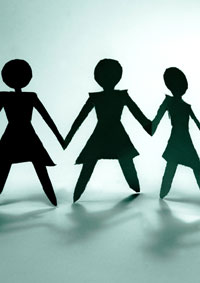Women’s Rights Are Human Rights
Why is it right and smart to empower women?
March 7, 2014

While women perform 66% of the world’s work and produce 50% of the food, they earn just 10% of incomes and own 1% of the property globally. And out of 197 countries, only 22 of them have women currently serving as heads of state, just 11.2%.
There is noticeable progress as well. Back in 1979, when the United Nations introduced the Convention on the Elimination of All Forms of Discrimination against Women, women held less than 6% of members of parliaments globally. Today, women’s global parliamentary representation is 21.4%, according to the Inter-parliamentary Union.
However, this is still well short of women’s proportionate share of the population. The most advanced are the Nordic countries, where women account for 42.2% of the parliamentary representatives, followed by the Americas with 25% and Europe with 23%.
While political life has thus become more open, many political, legal, cultural and economic barriers still exist. They range from non-enforcement of equitable laws and a lack of confidence and/or family support to a masculine political culture that still is nowhere near fully prepared to enable women to juggle work and family responsibilities.
Measures, quotas and prejudice
Still, over the past three decades, women have made significant strides. We have slowly and steadily advanced, earning more of the college degrees, taking more of the entry-level jobs and entering more into the fields dominated by men.
In education, women outpace men in educational achievement, with 58% of college graduates. While two-thirds of women graduate in the humanities and the arts, men continue to dominate in science with 60% of graduates. More girls than boys now complete their secondary education in 32 out of 34 OECD countries, accounting for around 60% of the total.
And yet, much more needs to be done. In particular, women are not making any real progress at the top of any industry. In business, the gender gap remains wide. In the United States, for example, only 21 of the CEOs of Fortune 500 companies are women.
Translation? When it comes to making the decisions that most affect our world, voices are not heard equally. Even with the necessary education, too many women face ceilings that hold back their ambition and aspirations. They are effectively contained to certain levels in advancing in their careers.
Women face real obstacles in the professional world: discrimination, sexism and barriers in society. They have to prove themselves to a far greater extent than men do.
A 2011 McKinsey report shows that men are promoted based on their potential, while women are promoted based on past accomplishments.
The women’s journey to this point has not been easy. Remarkable women paved the way for others to have a voice, including Mother Teresa, Susan B. Anthony, Madeleine Albright, Hillary Clinton, Angela Merkel, Christine Lagarde and Viviane Reding, to name a few.
These women have braved the storm and fought through bold actions for more equability in society. There are so many other brave women who fight every day for a better life.
It’s the economy stupid
Why is further progress so pivotal? It’s really simple. The basic laws of economics, not just many studies of diversity, tell us that if we tapped the entire pool of human resources and talent, our collective performance would improve. Global GDP could rise siginifcantly.
Research studies confirm a direct correlation between the gender gap in economic opportunities and economic growth. By contrast, the smaller the nation’s gender gap, the higher its economic productivity. The performance of Scandinavian countries is a full confirmation of the theory.
It sounds like such a cliché to say that women’s economic empowerment is a prerequisite to sustainable economic development and equitable societies. And yet, it is far more than that.
Crucially, it is not only a matter of improving the economy. It is also fundamentally a matter of sheer human justice and fairness.
In nearly every country, women work longer hours than men and are paid less. Women in poor countries do more unpaid work, work longer hours in the informal economy and accept degrading working conditions.
Moreover, in virtually every country, even the most advanced ones, domestic work still remains “invisible” work. This has grave socioeconomic consequences. The most important one of them is that it leads to significantly lower entitlements to women than to men. That can account for a big difference by the time a woman’s retirement age rolls around.
In developing countries, customs and traditions still override formal legal protections. This happens via the deeply ingrained patriarchal and conservative character of society, as well as the not-so-accidental perpetuation of leadership myths that are still in existence.
To make things even worse, domestic violence runs rampant in both rural and urban areas in these regions. Women are not informed of their rights, and a vast majority of them do not even trust the very structures that should protect them.
To its great discredit, the media play an important role in imprinting these stereotypes – and not just in developing countries. Far from it.
If the media really want to be an at least contemporary – and not a restraining – force, they must undertake a concerted effort to improve their performance in this regard. Much more than their own business fortunes depends on it. Their societies’ prosperity and sustainable future depend on it.
Politicians should do more to empower women. They should lead by giving women more power. Women in power should support other women. Because, as President Obama said recently, “empowering women isn’t just the right thing to do – it’s the smart thing to do.”
Editor’s note: This article reflects the views of the author and is not necessarily the official policy of the U.S. or German governments.
